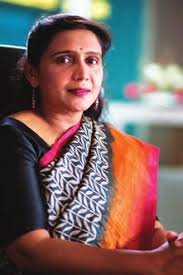
"Make it simple, but significant’is what we often hear when we are determined to start something new."
In our yet another sustain talks at sustain and save, Mrs. Vaishali Parakh had a very enthralling chat with Dr. Jasmin Sopia Gogia. Jasmin Sopia is head of CSR, sustainability and occupational health at Suzlon Foundation. She is a medical doctor with 27 years of experience in rural development and public health. Dr. Jasmin shared a simple innovation by Suzlon's CSR team, Suz Hookwhich changed the fate of an entire village in Maharashtra and how the village not only became cleaner and less polluted within a year but also improvised in various other scenarios.
Being pained by seeing plastic lying everywhere and finding its way to the rivers, Mrs. Jasmin always wanted to do something about it. On a personal level she always went for clean-up drives and has followed sustainable living. Heading the CSR team at Suzlon, she thought of cleaning and making the rural India plastic free. Under ‘SUZTAIN’(Suzlon’s CSR model), the team brainstormed an idea for collection of plastic with ease; ‘The Suz Hook’.
Suz hook is a very simple and a low-priced model. It uses just a hook-a traditional piece of metal used to pile away paper and plastic. This drive was first carried out at schools which didn’t just create awareness among the students but also led to prevention of waste at the households.
Behind every great initiative goes a lot of planning, strategizing and collaboration. It’s never a cake walk.Likewise, Suzlon along with their lovely NGO partners, volunteers, team, Swatchh Bharat organisation have successfully spread the awareness of responsible recycling and have also made 290 villages like Vitave, plastic free. This tailor made initiative has spread across the nation and continues to recycle plastic and help rural India become green.
‘Plastic and its role in degrading our environment’ is the rising issue we all are aware of. Many of us participate in clean up drives, many appeal to shift to cloth bags, many take efforts at their levels. But, following this once isn’t sustainable for preventing waste. As of today, there are as many as 51 trillion pieces of plastic in the ocean. There are animals dying, river bodies are getting contaminated, drainage systems are getting clogged, leading to deaths of people due to malaria and dengue. It’s an alarming situation and we really need to ponder upon the question, are we so accustomed to rigidity? Can’t we make waste-prevention our priority? How many more such animals and people have to suffer for us to change our course of habit?
A small step can go a long way. We need to take action on multiple fronts - not only as individuals, but as entrepreneurs, institutions, and companies. Let’s get hooked to sustainable living and try to leave a better, greener surrounding for our future generations to come!
By : Riya Nathe
